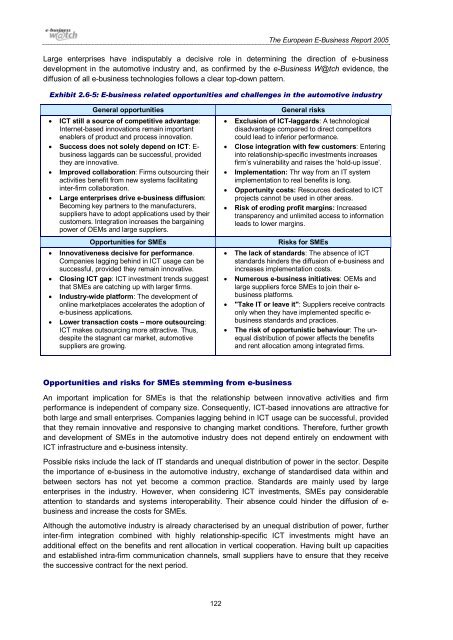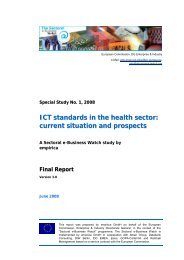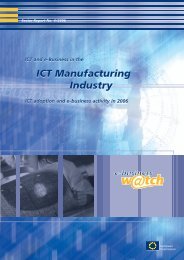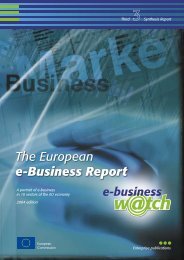The European e-Business Report The European e ... - empirica
The European e-Business Report The European e ... - empirica
The European e-Business Report The European e ... - empirica
You also want an ePaper? Increase the reach of your titles
YUMPU automatically turns print PDFs into web optimized ePapers that Google loves.
<strong>The</strong> <strong>European</strong> E-<strong>Business</strong> <strong>Report</strong> 2005<br />
Large enterprises have indisputably a decisive role in determining the direction of e-business<br />
development in the automotive industry and, as confirmed by the e-<strong>Business</strong> W@tch evidence, the<br />
diffusion of all e-business technologies follows a clear top-down pattern.<br />
Exhibit 2.6-5: E-business related opportunities and challenges in the automotive industry<br />
General opportunities<br />
• ICT still a source of competitive advantage:<br />
Internet-based innovations remain important<br />
enablers of product and process innovation.<br />
• Success does not solely depend on ICT: E-<br />
business laggards can be successful, provided<br />
they are innovative.<br />
• Improved collaboration: Firms outsourcing their<br />
activities benefit from new systems facilitating<br />
inter-firm collaboration.<br />
• Large enterprises drive e-business diffusion:<br />
Becoming key partners to the manufacturers,<br />
suppliers have to adopt applications used by their<br />
customers. Integration increases the bargaining<br />
power of OEMs and large suppliers.<br />
Opportunities for SMEs<br />
• Innovativeness decisive for performance.<br />
Companies lagging behind in ICT usage can be<br />
successful, provided they remain innovative.<br />
• Closing ICT gap: ICT investment trends suggest<br />
that SMEs are catching up with larger firms.<br />
• Industry-wide platform: <strong>The</strong> development of<br />
online marketplaces accelerates the adoption of<br />
e-business applications.<br />
• Lower transaction costs – more outsourcing:<br />
ICT makes outsourcing more attractive. Thus,<br />
despite the stagnant car market, automotive<br />
suppliers are growing.<br />
General risks<br />
• Exclusion of ICT-laggards: A technological<br />
disadvantage compared to direct competitors<br />
could lead to inferior performance.<br />
• Close integration with few customers: Entering<br />
into relationship-specific investments increases<br />
firm’s vulnerability and raises the ‘hold-up issue’.<br />
• Implementation: Thr way from an IT system<br />
implementation to real benefits is long.<br />
• Opportunity costs: Resources dedicated to ICT<br />
projects cannot be used in other areas.<br />
• Risk of eroding profit margins: Increased<br />
transparency and unlimited access to information<br />
leads to lower margins.<br />
Risks for SMEs<br />
• <strong>The</strong> lack of standards: <strong>The</strong> absence of ICT<br />
standards hinders the diffusion of e-business and<br />
increases implementation costs.<br />
• Numerous e-business initiatives: OEMs and<br />
large suppliers force SMEs to join their e-<br />
business platforms.<br />
• "Take IT or leave it": Suppliers receive contracts<br />
only when they have implemented specific e-<br />
business standards and practices.<br />
• <strong>The</strong> risk of opportunistic behaviour: <strong>The</strong> unequal<br />
distribution of power affects the benefits<br />
and rent allocation among integrated firms.<br />
Opportunities and risks for SMEs stemming from e-business<br />
An important implication for SMEs is that the relationship between innovative activities and firm<br />
performance is independent of company size. Consequently, ICT-based innovations are attractive for<br />
both large and small enterprises. Companies lagging behind in ICT usage can be successful, provided<br />
that they remain innovative and responsive to changing market conditions. <strong>The</strong>refore, further growth<br />
and development of SMEs in the automotive industry does not depend entirely on endowment with<br />
ICT infrastructure and e-business intensity.<br />
Possible risks include the lack of IT standards and unequal distribution of power in the sector. Despite<br />
the importance of e-business in the automotive industry, exchange of standardised data within and<br />
between sectors has not yet become a common practice. Standards are mainly used by large<br />
enterprises in the industry. However, when considering ICT investments, SMEs pay considerable<br />
attention to standards and systems interoperability. <strong>The</strong>ir absence could hinder the diffusion of e-<br />
business and increase the costs for SMEs.<br />
Although the automotive industry is already characterised by an unequal distribution of power, further<br />
inter-firm integration combined with highly relationship-specific ICT investments might have an<br />
additional effect on the benefits and rent allocation in vertical cooperation. Having built up capacities<br />
and established intra-firm communication channels, small suppliers have to ensure that they receive<br />
the successive contract for the next period.<br />
122

















